Comprehensive Guide to Garden Maintenance in Ealing
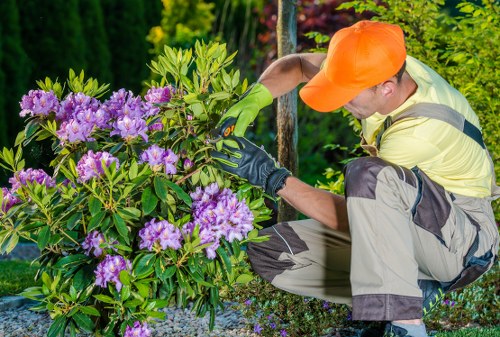
Maintaining a beautiful garden in Ealing requires a combination of proper planning, regular care, and understanding the local climate. Whether you're a seasoned gardener or just starting out, keeping your garden in pristine condition can greatly enhance the aesthetics of your home and provide a serene outdoor space for relaxation.
In this guide, we will explore various aspects of garden maintenance specific to Ealing's environment, including seasonal tasks, plant selection, soil health, and pest control. By following these tips, you can ensure that your garden remains vibrant and healthy throughout the year.
Understanding the unique characteristics of Ealing's climate is crucial for effective garden maintenance. The region experiences a temperate maritime climate, with mild winters and warm summers, making it suitable for a wide variety of plants. However, occasional rainfall and varying temperatures can pose challenges that gardeners need to address proactively.
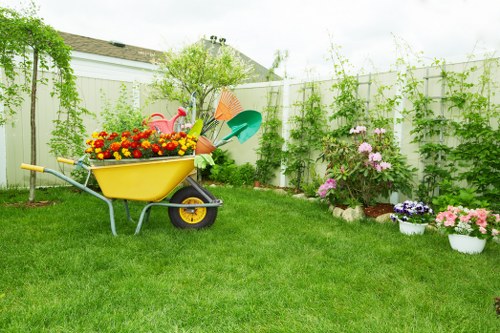
Seasonal Garden Maintenance
Proper garden maintenance involves adapting your care routine to the changing seasons. Each season brings its own set of tasks that help maintain the health and beauty of your garden.
Spring
Spring is a critical time for garden maintenance as it marks the beginning of the growing season. Tasks during this period include:
- Pruning: Remove dead or damaged branches from trees and shrubs to encourage new growth.
- Planting: Introduce new perennials, annuals, and vegetables to your garden.
- Soil Preparation: Amend the soil with compost or fertilizer to provide essential nutrients for plants.
- Weed Control: Remove weeds to reduce competition for resources.
By addressing these tasks in spring, you set the foundation for a thriving garden throughout the year.
Effective spring maintenance ensures your garden starts the year strong.
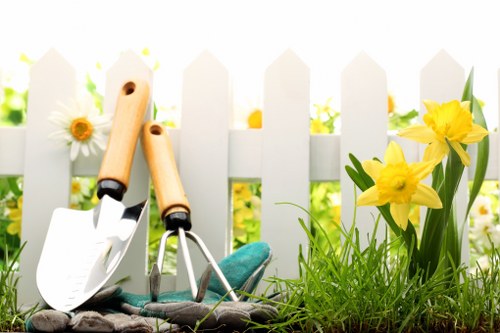
Summer Care
Summer brings warmer temperatures and longer days, which promote robust plant growth. However, it also requires increased attention to prevent issues such as drought stress and pest infestations.
Watering Strategies
Consistent watering is essential during summer months. Implement the following strategies:
- Early Morning Watering: Watering in the early morning reduces evaporation and allows plants to absorb moisture before the heat of the day.
- Deep Watering: Encourage deep root growth by watering thoroughly, ensuring that water reaches the root zone.
- Mulching: Apply mulch around plants to retain moisture and regulate soil temperature.
Proper watering techniques help plants withstand the summer heat and maintain their health.
Consistent care during summer can prevent common gardening problems and keep your garden flourishing.
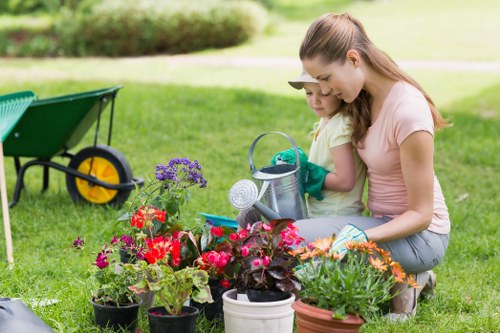
Autumn Preparation
Autumn is a time for preparing your garden for the cooler months ahead. Key maintenance tasks include:
Leaf Management
Regularly raking and removing fallen leaves prevents the buildup of debris that can harbor pests and diseases.
- Composting leaves: Turn leaves into nutrient-rich compost for future use.
- Mulching: Use shredded leaves as mulch to protect plant roots during winter.
Effective leaf management contributes to a healthier garden ecosystem.
Preparing your garden in autumn sets the stage for a smooth transition into winter.
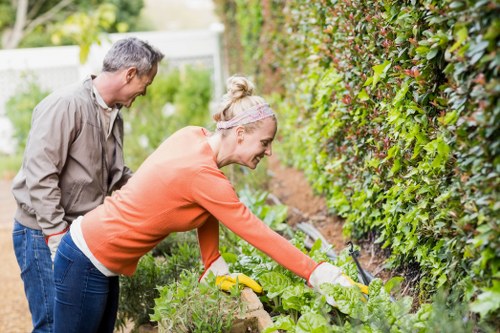
Winter Protection
Winter poses challenges such as frost, snow, and reduced sunlight. To safeguard your garden:
Plant Protection
Shield delicate plants from harsh conditions by using:
- Frost Covers: Protect plants with specialized frost blankets or cloches.
- Mulching: Apply a thick layer of mulch to insulate plant roots.
- Wind Barriers: Install barriers to reduce the impact of cold winds on sensitive plants.
These measures help ensure that your garden survives the winter and emerges healthy in spring.
Winter protection is essential for maintaining garden health during the coldest months.

Soil Health and Fertilization
Healthy soil is the foundation of a thriving garden. Maintaining soil health involves:
Soil Testing
Conduct regular soil tests to determine nutrient levels and pH balance. This information guides appropriate fertilization and soil amendments.
- Organic Matter: Incorporate compost or well-rotted manure to improve soil structure and fertility.
- pH Adjustment: Modify soil pH based on test results to optimize nutrient availability for plants.
Proper soil management enhances plant growth and resilience.
Investing in soil health pays dividends in the overall success of your garden.

Plant Selection and Care
Choosing the right plants is crucial for a successful garden in Ealing. Consider native and climate-resistant species to ensure adaptability and minimal maintenance.
Native Plants
Native plants are well-suited to the local climate and soil conditions, requiring less water and fewer pesticides. Benefits include:
- Adaptability: Thrive naturally in Ealing's environment.
- Biodiversity: Support local wildlife and pollinators.
- Low Maintenance: Require fewer resources once established.
Incorporating native plants contributes to a sustainable and resilient garden.
Selecting the right plants ensures a vibrant and manageable garden.

Pest and Disease Management
Effective pest and disease control is vital for maintaining garden health. Implement integrated pest management (IPM) strategies to minimize chemical usage and protect beneficial insects.
Identification and Monitoring
Regularly inspect plants for signs of pests and diseases. Early detection enables timely intervention, reducing the spread and impact of issues.
- Visual Inspection: Check leaves, stems, and roots for discoloration, holes, or other damage.
- Sticky Traps: Use traps to monitor and capture flying pests.
Proactive monitoring helps maintain a healthy garden environment.
Implementing IPM strategies ensures effective and environmentally friendly pest control.

Pruning and Trimming Techniques
Regular pruning and trimming are essential for plant health, shape, and productivity. Proper techniques involve:
Pruning Tools
Use appropriate tools, such as sharp shears and loppers, to make clean cuts that promote healing and reduce the risk of disease.
- Timing: Prune plants during their dormant season or after flowering, depending on the species.
- Technique: Remove dead or crossing branches and shape plants to allow adequate airflow and sunlight penetration.
Effective pruning enhances the overall appearance and vitality of your garden.
Mastering pruning techniques is key to maintaining a well-kept garden.

Lawn Care in Ealing
A lush, green lawn adds significant value to your garden. Maintaining a healthy lawn involves:
Regular Mowing
Mow the lawn regularly to encourage dense growth and prevent weed establishment. Tips include:
- Mowing Height: Adjust the mower to the appropriate height for your grass type.
- Blade Maintenance: Keep mower blades sharp for clean cuts.
Proper mowing techniques contribute to a resilient and attractive lawn.
A well-maintained lawn serves as the foundation of a beautiful garden.

Irrigation Systems
Efficient watering systems are essential for sustaining your garden, especially during dry spells. Consider the following options:
Drip Irrigation
Drip irrigation delivers water directly to the plant roots, minimizing evaporation and conserving water. Advantages include:
- Water Efficiency: Reduces water waste compared to traditional sprinklers.
- Targeted Delivery: Ensures plants receive adequate moisture.
Installing a drip irrigation system can lead to significant water savings and healthier plants.
Investing in a quality irrigation system ensures consistent and efficient garden watering.

Composting and Waste Management
Composting organic waste is an eco-friendly way to recycle garden and kitchen scraps, enriching your soil with valuable nutrients.
Setting Up a Compost Bin
Follow these steps to create an effective compost system:
- Choose a Location: Select a well-drained area with good airflow.
- Balance Materials: Combine green (nitrogen-rich) and brown (carbon-rich) materials in appropriate ratios.
- Maintain Moisture: Keep the compost pile damp but not waterlogged.
Regularly turning the compost promotes decomposition and accelerates the process.
Effective composting reduces waste and enhances soil fertility.

Using Organic Fertilizers
Organic fertilizers improve soil health without the negative impacts of chemical alternatives. Benefits include:
Types of Organic Fertilizers
Common organic fertilizers include:
- Compost: Provides a balanced mix of nutrients and improves soil structure.
- Bone Meal: Rich in phosphorus, promoting strong root development.
- Fish Emulsion: High in nitrogen, boosting leafy green growth.
Incorporating organic fertilizers supports sustainable garden practices and long-term plant health.
Choosing organic fertilizers fosters a healthy and eco-friendly garden environment.

Garden Design and Layout
Thoughtful garden design enhances both functionality and aesthetics. Consider the following elements:
Plant Arrangement
Arrange plants based on their size, color, and growth habits to create visually appealing arrangements.
- Layering: Position taller plants at the back and shorter ones in front.
- Color Coordination: Use complementary colors to create striking contrasts.
A well-designed garden layout promotes plant health and creates an inviting outdoor space.
Strategic garden design transforms your outdoor area into a harmonious and beautiful retreat.

Professional Garden Maintenance Services in Ealing
For those seeking expert assistance, professional garden maintenance services in Ealing offer comprehensive solutions tailored to your needs. Services typically include:
Comprehensive Maintenance Plans
Professional gardeners provide customized maintenance plans that cover all aspects of garden care, ensuring consistent and high-quality results.
- Lawn Care: Regular mowing, fertilizing, and aeration.
- Plant Care: Pruning, trimming, and disease management.
- Seasonal Services: Adapting maintenance tasks to seasonal changes.
Hiring professionals can save you time and ensure your garden remains in excellent condition year-round.
Contact us today to discover how our garden maintenance services can transform your Ealing garden.

Eco-Friendly Gardening Practices
Adopting eco-friendly practices contributes to a sustainable garden ecosystem. Key strategies include:
Water Conservation
Implement water-saving techniques such as rainwater harvesting and using drought-resistant plants to reduce your garden's water footprint.
- Rain Barrels: Collect rainwater for irrigation purposes.
- Mulching: Retain soil moisture and reduce evaporation.
These practices help conserve water while maintaining a healthy garden.
Eco-friendly gardening supports environmental sustainability and resource conservation.

Garden Lighting Solutions
Outdoor lighting enhances the beauty and functionality of your garden, allowing you to enjoy it even after dark.
Types of Garden Lighting
Consider the following lighting options:
- Solar Lights: Energy-efficient and easy to install, solar lights charge during the day and illuminate at night.
- LED Fixtures: Durable and long-lasting, LED lights provide bright and customizable illumination.
- Pathway Lights: Illuminate walkways and highlight garden features for safety and aesthetics.
Proper garden lighting enhances safety, highlights key areas, and creates a welcoming atmosphere.
Incorporate garden lighting to extend your outdoor enjoyment into the evening hours.

Plant Propagation Techniques
Expanding your garden through plant propagation allows you to increase your plant collection and share with others. Common propagation methods include:
Seed Sowing
Starting plants from seeds is an economical way to grow a diverse range of species. Tips for successful seed sowing:
- Seed Selection: Choose seeds suited to Ealing's climate and your garden's conditions.
- Proper Sowing Depth: Follow guidelines for each plant type to ensure successful germination.
Seed sowing fosters a wide variety of plant growth and garden diversity.
Effective propagation techniques enable you to cultivate a thriving and varied garden.

Tool Maintenance and Storage
Proper maintenance of gardening tools extends their lifespan and ensures efficient performance. Key practices include:
Cleaning and Sharpening
After each use, clean tools to remove dirt and debris. Regularly sharpen blades to maintain cutting efficiency.
- Oiling: Apply oil to metal parts to prevent rust and corrosion.
- Proper Storage: Store tools in a dry, organized space to avoid damage and facilitate easy access.
Well-maintained tools make gardening tasks easier and more enjoyable.
Investing in tool maintenance ensures your equipment remains reliable and effective.

Creating a Wildlife-Friendly Garden
A wildlife-friendly garden attracts beneficial creatures such as bees, butterflies, and birds, enhancing biodiversity and pollination.
Habitat Features
Incorporate elements that provide shelter and food for wildlife:
- Bee Hotels: Provide nesting sites for solitary bees.
- Bird Feeders: Attract birds and support their dietary needs.
- Water Sources: Install birdbaths or small ponds to offer drinking and bathing opportunities.
Creating habitats supports local wildlife and contributes to a balanced ecosystem.
Promote biodiversity by designing a garden that welcomes and supports wildlife.

Selecting the Right Garden Furniture
Choosing appropriate garden furniture enhances the functionality and comfort of your outdoor space.
Materials and Durability
Opt for furniture made from durable materials that can withstand Ealing's weather conditions:
- Teak: Naturally resistant to moisture and pests.
- Aluminum: Lightweight and rust-resistant.
- Wicker: Stylish and comfortable, with synthetic options offering greater durability.
Quality garden furniture adds aesthetic appeal and usability to your garden area.
Invest in sturdy and stylish furniture to create a welcoming outdoor living space.

Mulching Techniques
Mulching is an essential practice for conserving soil moisture, suppressing weeds, and enhancing soil health.
Types of Mulch
Choose from organic and inorganic mulches based on your garden's needs:
- Organic Mulch: Includes bark, straw, and compost, which enrich the soil as they decompose.
- Inorganic Mulch: Consists of materials like gravel or plastic, which are long-lasting but do not improve soil fertility.
Applying mulch correctly ensures optimal benefits for your garden plants.
Effective mulching techniques support plant health and reduce maintenance efforts.

Edging and Border Maintenance
Maintaining clear edges and borders defines garden spaces and contributes to a neat appearance.
Edging Materials
Select materials that complement your garden's style, such as:
- Brick: Offers a classic and sturdy boundary.
- Metal: Provides a sleek and modern edge.
- Natural Stone: Blends seamlessly with garden surroundings.
Proper edging prevents grass from encroaching into flower beds and maintains tidy borders.
Clear and well-maintained borders enhance the overall organization and beauty of your garden.

Vertical Gardening Solutions
Vertical gardening optimizes space and adds visual interest to your garden by utilizing vertical structures.
Types of Vertical Gardens
Consider various vertical gardening options, such as:
- Trellises: Support climbing plants like vines and roses.
- Wall Planters: Allow for potted plants to be mounted on walls.
- Living Walls: Feature a variety of plants arranged in a structured format.
Vertical gardens are ideal for small spaces and can serve as focal points in your garden design.
Incorporate vertical gardening to maximize space and create dynamic visual elements.

Hardscaping Elements
Integrating hardscaping features such as pathways, patios, and garden structures enhances functionality and aesthetic appeal.
Choosing Hardscape Materials
Select materials that complement your garden's style and are durable in Ealing's climate:
- Stone: Offers a natural and timeless look.
- Concrete: Versatile and cost-effective for various applications.
- Brick: Provides a classic and structured appearance.
Well-planned hardscaping improves garden navigation and creates inviting spaces for outdoor activities.
Thoughtful hardscaping design integrates functionality with visual harmony in your garden.

Maintaining Garden Tools and Equipment
Proper care of garden tools ensures they remain effective and safe to use. Key maintenance tips include:
Cleaning and Storage
After each use, clean tools to remove soil and debris. Store them in a dry, organized space to prevent rust and damage.
- Tool Cleaning: Use brushes and water to clean tools thoroughly.
- Sharpening: Regularly sharpen blades and edges for optimal performance.
Maintaining tools prolongs their lifespan and improves gardening efficiency.
Invest in regular tool maintenance to ensure your equipment remains reliable and effective.

Gardening for All Seasons
Adapting your gardening practices to each season ensures year-round beauty and productivity. Consider the following seasonal adjustments:
Spring Care
Emphasize planting, pruning, and soil preparation to kickstart the growing season.
- Planting: Introduce new plants and seeds.
- Pruning: Remove winter damage and shape plants.
By aligning your maintenance tasks with seasonal needs, you can create a resilient and thriving garden.
Embrace seasonal gardening to maintain a vibrant and dynamic outdoor space throughout the year.

Conclusion
Maintaining a beautiful garden in Ealing requires dedication, knowledge, and the right strategies to address the local climate and conditions. By following the tips outlined in this guide, you can ensure that your garden remains healthy, vibrant, and a source of pride for your home.
Whether you choose to undertake garden maintenance yourself or enlist the help of professional services, consistent care and attention are key to achieving the garden of your dreams.
Book your garden maintenance service now and transform your Ealing garden into a stunning outdoor haven.
